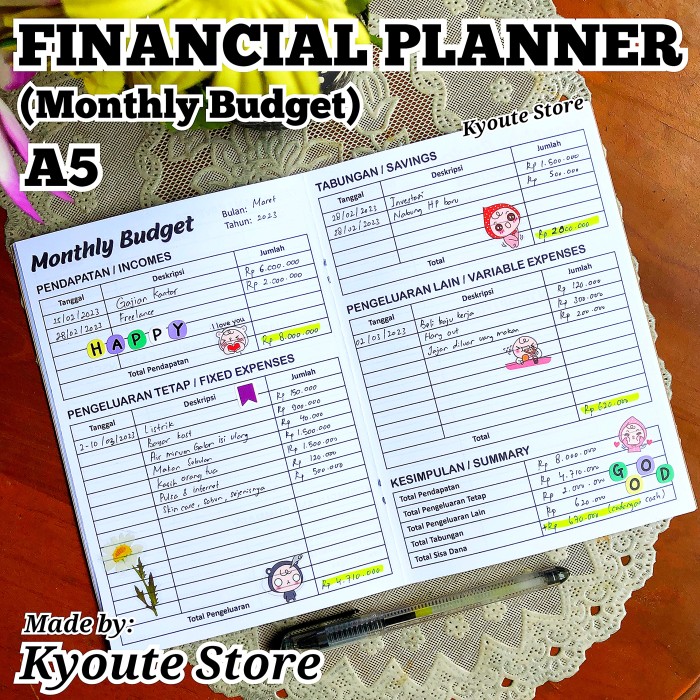In today’s complex financial landscape, managing your money effectively has become more crucial than ever. Whether you’re looking to save for a major purchase, plan for retirement, or simply gain control over your day-to-day finances, a finance planner can be an invaluable tool in your journey to financial success. This comprehensive guide will explore the world of finance planners, delving into their types, benefits, how to choose the right one for your needs, and how to make the most of this powerful financial management tool.
Understanding Finance Planners: What They Are and Why You Need One
Before diving into the specifics, it’s essential to understand what a finance planner is and why it’s a crucial tool for managing your financial life.
Defining Finance Planners
A finance planner, also known as a financial planner or money planner, is a tool or system designed to help individuals and families organize, track, and manage their financial lives. This can range from simple budgeting spreadsheets to comprehensive software applications that integrate various aspects of personal finance.
Key components of a finance planner typically include:
- Budgeting tools
- Expense tracking
- Savings goals
- Investment tracking
- Debt management
- Financial goal setting and monitoring
- Net worth calculations
Finance planners can be digital (apps or software) or physical (paper planners or binders), depending on personal preference and needs.
The Importance of Financial Planning
Using a finance planner is more than just a good habit; it’s a crucial step towards achieving financial stability and success. Here’s why financial planning is so important:
- Clarity and Control: A finance planner provides a clear picture of your financial situation, giving you greater control over your money.
- Goal Achievement: By setting and tracking financial goals, you’re more likely to achieve them. A study by Dominican University found that people who write down their goals are 42% more likely to achieve them than those who don’t.
- Stress Reduction: Financial stress is a significant issue for many people. A 2021 Capital One CreditWise survey found that 73% of Americans rank finances as their top stressor. A finance planner can help alleviate this stress by providing structure and visibility to your financial life.
- Better Decision Making: With a comprehensive view of your finances, you can make more informed decisions about spending, saving, and investing.
- Long-term Financial Health: Regular financial planning helps you prepare for the future, whether it’s building an emergency fund, saving for retirement, or planning for major life events.
Quote from Financial Expert: “A finance planner is like a roadmap for your money. It shows you where you are, where you want to go, and helps you navigate the path to get there.” – Jane Smith, Certified Financial Planner
Types of Finance Planners: Choosing the Right Tool for Your Needs
Finance planners come in various forms, each with its own strengths and ideal use cases. Understanding the different types can help you choose the one that best fits your financial management style and goals.
Digital Finance Planners
Digital finance planners have become increasingly popular due to their convenience and powerful features.
- Budgeting Apps:
- Examples: Mint, YNAB (You Need A Budget), Personal Capital
- Best for: Daily expense tracking and budgeting
- Features: Automatic transaction categorization, bill reminders, goal tracking
- Comprehensive Financial Management Software:
- Examples: Quicken, MoneyDance
- Best for: Detailed financial management including investments and taxes
- Features: Investment tracking, tax planning, robust reporting
- Spreadsheet Templates:
- Examples: Google Sheets, Microsoft Excel templates
- Best for: Those who prefer customization and manual data entry
- Features: Flexibility, ability to create custom calculations and reports
Advantages of Digital Planners:
- Automatic syncing with bank accounts and credit cards
- Real-time updates and alerts
- Accessibility across multiple devices
- Advanced analytics and reporting capabilities
Case Study: The Power of Digital Finance Planning Sarah, a 32-year-old marketing professional, struggled with overspending and saving. After downloading a popular budgeting app, she was able to:
- Identify and cut $300 in unnecessary monthly expenses
- Set up automatic savings of $200 per month
- Pay off $5,000 in credit card debt within 18 months
- Build an emergency fund of $10,000 over two years
Sarah attributes her financial turnaround to the visibility and accountability provided by her digital finance planner.
Physical Finance Planners
While digital tools are popular, many people still prefer the tactile experience of physical planners.
- Pre-printed Finance Planners:
- Examples: Clever Fox Budget Planner, Erin Condren Financial Planner
- Best for: Visual learners who enjoy writing and prefer a screen-free approach
- Features: Monthly and weekly budget layouts, savings trackers, goal-setting sections
- Bullet Journals:
- A customizable journaling system that can be adapted for financial planning
- Best for: Creative individuals who enjoy designing their own layouts
- Features: Flexibility to create personalized tracking systems and financial logs
- Binder Systems:
- DIY approach using a binder with customizable inserts
- Best for: Those who want a highly personalized and adaptable system
- Features: Can include budget worksheets, bill payment trackers, savings logs, and more
Advantages of Physical Planners:
- No reliance on technology or internet connection
- Can provide a more mindful, intentional approach to financial planning
- Physical act of writing can enhance memory and commitment to financial goals
Fact: A study published in Psychological Science found that people who write down their goals by hand are 33% more likely to achieve them compared to those who type them or don’t write them down at all.
Hybrid Approaches
Some people find that a combination of digital and physical planning works best for them.
Example Hybrid System:
- Use a budgeting app for daily expense tracking and account syncing
- Maintain a physical planner for goal setting, reflection, and long-term planning
- Use spreadsheets for detailed investment tracking and net worth calculations
This approach allows you to leverage the strengths of both digital and physical planning methods.
Key Features to Look for in a Finance Planner
Regardless of the type of finance planner you choose, certain features are crucial for effective financial management.
Budgeting Tools
A robust budgeting system is the foundation of any good finance planner.
Essential Budgeting Features:
- Income and Expense Tracking: Ability to log and categorize all financial transactions
- Customizable Categories: Flexibility to create and modify expense categories
- Bill Payment Tracking: Reminders and logs for regular bill payments
- Visual Representations: Charts and graphs to visualize spending patterns
Advanced Budgeting Features:
- Envelope Budgeting System: Digital or physical system for allocating money to specific expense categories
- Zero-Based Budgeting: Tool for assigning every dollar of income to a specific purpose
- Budget vs. Actual Comparisons: Ability to compare planned budget with actual spending
Tip: Look for a planner that allows you to set up both fixed and variable expenses, as this will give you a more accurate picture of your monthly cash flow.
Goal Setting and Tracking
Effective financial planning is goal-oriented. Your finance planner should have robust features for setting and monitoring financial goals.
Key Goal-Setting Features:
- SMART Goal Framework: Tools that help you set Specific, Measurable, Achievable, Relevant, and Time-bound goals
- Progress Tracking: Visual indicators of progress towards goals
- Milestone Setting: Ability to break larger goals into smaller, manageable milestones
- Goal Prioritization: Features to help you rank and focus on your most important financial objectives
Example Goal-Setting Process:
- Set a goal to save $10,000 for a home down payment in 2 years
- Break it down into monthly savings targets of $416.67
- Create a visual tracker in your planner to monitor progress
- Set up automatic transfers to a dedicated savings account
- Regularly review and adjust your budget to ensure you’re on track
Savings and Investment Tracking
For long-term financial health, your finance planner should help you manage your savings and investments.
Essential Savings and Investment Features:
- Savings Rate Calculation: Tool to determine what percentage of your income you’re saving
- Investment Portfolio Tracking: Ability to log and monitor various investment accounts
- Asset Allocation Visualization: Charts showing the distribution of your investments
- Return on Investment (ROI) Calculations: Tools to measure the performance of your investments
Advanced Features:
- Retirement Planning Tools: Calculators to project retirement savings needs
- Tax Optimization Suggestions: Guidance on tax-efficient investing strategies
- Rebalancing Reminders: Alerts to review and adjust your investment mix periodically
Quote from Investment Advisor: “A good finance planner doesn’t just track your current finances; it helps you build and monitor a roadmap for your financial future.” – Michael Johnson, Certified Financial Analyst
Debt Management Tools
For many people, managing and reducing debt is a crucial part of their financial plan.
Key Debt Management Features:
- Debt Inventory: A comprehensive list of all debts, including balances, interest rates, and minimum payments
- Debt Payoff Strategies: Tools for implementing strategies like the debt snowball or debt avalanche methods
- Interest Calculations: Ability to see the long-term impact of interest on your debts
- Payoff Date Projections: Estimates of when debts will be fully paid based on current payments
Case Study: Debt Reduction Success John, a 28-year-old teacher, used his finance planner’s debt management tools to tackle $30,000 in student loans and credit card debt. By visualizing his debts and implementing the debt avalanche method (paying off highest interest debts first), he was able to:
- Pay off all debts within 3 years
- Save over $5,000 in interest compared to making minimum payments
- Improve his credit score by 100 points
John’s success demonstrates the power of having a clear debt reduction strategy and the tools to implement it effectively.
Implementing Your Finance Planner: Best Practices for Success
Having a finance planner is just the first step. To truly benefit from this tool, you need to implement it effectively and consistently in your financial life.
Setting Up Your Finance Planner
The initial setup of your finance planner is crucial for long-term success.
Steps for Effective Setup:
- Gather Financial Information:
- Collect recent bank statements, credit card bills, pay stubs, and investment account information
- List all regular income sources and expenses
- Define Your Financial Goals:
- Short-term goals (e.g., building an emergency fund)
- Medium-term goals (e.g., saving for a down payment on a house)
- Long-term goals (e.g., retirement planning)
- Create Your Budget:
- Set realistic spending limits for each category
- Ensure your budget aligns with your financial goals
- Set Up Tracking Systems:
- Decide how you’ll log expenses (e.g., daily input, weekly review)
- Set up automatic import of transactions if using a digital planner
- Establish Review and Adjustment Periods:
- Schedule regular times (weekly, monthly) to review your finances
- Plan for quarterly or bi-annual deeper reviews to adjust your overall financial strategy
Tip: Be as detailed as possible in your initial setup. The more comprehensive your financial picture, the more effective your planning will be.
Developing Financial Planning Habits
Consistency is key in financial planning. Developing strong habits will help you make the most of your finance planner.
Essential Financial Planning Habits:
- Daily:
- Record expenses
- Check account balances
- Weekly:
- Review and categorize transactions
- Compare actual spending to budgeted amounts
- Monthly:
- Conduct a full budget review
- Update progress on financial goals
- Pay bills and make debt payments
- Quarterly:
- Review and rebalance investments
- Adjust budget categories as needed
- Reassess short-term financial goals
- Annually:
- Conduct a comprehensive financial review
- Set new goals for the coming year
- Review and update insurance coverage
Quote from Behavioral Economist: “The power of a finance planner lies not in the tool itself, but in the habits it helps you form. Consistent, mindful engagement with your finances is the true key to long-term financial success.” – Dr. Sarah Thompson, Behavioral Finance Researcher
Overcoming Common Challenges
Even with the best intentions, many people face challenges in sticking to their financial plans. Here are some common obstacles and strategies to overcome them:
- Lack of Time:
- Solution: Schedule specific times for financial planning, treating it as an important appointment
- Use automation features in digital planners to reduce time investment
- Overwhelm:
- Solution: Start small with basic budgeting and gradually add more complex financial planning elements
- Break larger financial tasks into smaller, manageable steps
- Unexpected Expenses:
- Solution: Build an emergency fund into your financial plan
- Regularly review and adjust your budget to account for variable expenses
- Loss of Motivation:
- Solution: Celebrate small financial wins to maintain momentum
- Visualize progress towards goals using charts or trackers in your planner
- Information Overload:
- Solution: Focus on key financial metrics that align with your goals
- Use the reporting features of your planner to distill complex information into actionable insights
Remember, the goal is progress, not perfection. Be patient with yourself as you develop your financial planning skills.
Advanced Finance Planning Strategies
Once you’ve mastered the basics of using a finance planner, you can explore more advanced strategies to optimize your financial life.
Integrating Multiple Financial Tools
While a finance planner is a powerful tool on its own, integrating it with other financial tools can provide a more comprehensive approach to managing your money.
Complementary Tools to Consider:
- Retirement Calculators:
- Use alongside your planner to project long-term savings needs
- Adjust current savings and investment strategies based on projections
- Credit Monitoring Services:
- Track your credit score and report alongside your other financial metrics
- Use insights to inform debt management and financial goal setting
- Tax Preparation Software:
- Integrate tax planning into your overall financial strategy
- Use tax insights to optimize savings and investment decisions
- Estate Planning Tools:
- Incorporate long-term estate planning into your financial goals
- Ensure your finance planner aligns with your estate planning objectives
By integrating these tools, you can create a more holistic view of your financial life and make more informed decisions.
Leveraging Data Analytics
Many modern finance planners offer advanced analytics features that can provide deeper insights into your financial behavior and opportunities for improvement.
Key Analytics to Explore:
- Spending Pattern Analysis:
- Identify trends in your spending over time
- Uncover opportunities for cost-cutting or reallocation of funds
- Cash Flow Forecasting:
- Project future income and expenses
- Identify potential cash flow issues before they occur
- Investment Performance Analytics:
- Compare your portfolio performance against benchmarks
- Analyze the impact of different investment scenarios
- Financial Ratio Calculations:
- Track important ratios like savings rate, debt-to-income ratio, and net worth growth
- Use these metrics to gauge overall financial health and progress
Tip: Don’t get overwhelmed by data. Focus on the analytics that are most relevant to your current financial goals and stage of life.
Scenario Planning
Advanced finance planners often include tools for scenario planning, allowing you to model different financial situations and their potential outcomes.
Common Scenarios to Model:
- Career Changes:
- Impact of job loss or career transition on finances
- Financial requirements for starting a business
- Major Life Events:
- Financial implications of marriage, having children, or divorce
- Preparing for elder care or inheritance
- Housing Decisions:
- Buy vs. rent analysis
- Impact of upsizing or downsizing your home
- Education Planning:
- Saving for children’s education
- Financial impact of pursuing further education yourself
- Retirement Scenarios:
- Early retirement options
- Impact of different withdrawal rates in retirement
By regularly engaging in scenario planning, you can better prepare for life’s uncertainties and make more informed financial decisions.
The Future of Finance Planners
As technology continues to evolve, so do the capabilities of finance planners. Understanding emerging trends can help you choose a planner that will remain relevant and useful in the years to come.
Artificial Intelligence and Machine Learning Integration
The integration of AI and machine learning into finance planners is revolutionizing how we manage our money.
Key AI-Driven Features:
- Predictive Analytics:
- Forecasting future expenses based on historical spending patterns
- Predicting potential cash flow issues before they occur
- Personalized Financial Advice:
- AI-powered recommendations for budget adjustments
- Tailored investment suggestions based on risk profile and goals
- Anomaly Detection:
- Identifying unusual transactions that may indicate fraud
- Alerting users to significant deviations from typical spending patterns
- Natural Language Processing:
- Ability to interact with the planner using voice commands or chatbots
- Converting financial data into easy-to-understand narratives
Case Study: AI-Powered Savings Emily, a 35-year-old marketing manager, started using an AI-enhanced finance planner. Within six months:
- The AI identified $200 in monthly subscriptions she wasn’t fully utilizing, allowing her to cut unnecessary expenses
- Predictive analytics helped her anticipate seasonal expenses, improving her budgeting accuracy by 25%
- Personalized investment advice led to a 2% increase in her portfolio returns
Emily’s experience demonstrates how AI can provide actionable insights and improve financial outcomes.
Open Banking and Data Aggregation
The rise of open banking is making it easier for finance planners to provide a comprehensive view of your financial life.
Benefits of Open Banking Integration:
- Holistic Financial View:
- Aggregation of data from multiple financial institutions in one place
- Real-time updates on account balances and transactions
- Improved Accuracy:
- Reduction in manual data entry errors
- More timely and precise financial insights
- Enhanced Financial Products:
- Ability to receive personalized product recommendations based on your financial profile
- Easier comparison of financial products across institutions
- Streamlined Money Management:
- Initiation of payments and transfers directly from the finance planner
- Automated savings based on spending patterns and goals
Fact: According to a 2021 report by Plaid, 80% of Americans use digital finance tools that rely on data connectivity, highlighting the growing importance of open banking in personal finance management.
Blockchain and Cryptocurrency Integration
As cryptocurrencies become more mainstream, finance planners are evolving to incorporate these digital assets.
Key Developments:
- Cryptocurrency Tracking:
- Integration of cryptocurrency wallets into overall net worth calculations
- Real-time tracking of cryptocurrency values and portfolio performance
- Blockchain-Based Security:
- Enhanced data security using blockchain technology
- Immutable transaction records for improved accuracy and trust
- Smart Contract Integration:
- Automated execution of financial transactions based on predefined conditions
- Potential for more efficient loan repayments, insurance claims, and investment distributions
- Decentralized Finance (DeFi) Tools:
- Integration of DeFi platforms for yield farming and liquidity provision
- Tools for managing and optimizing returns from decentralized financial products
While still emerging, these blockchain-based features have the potential to significantly impact how we manage and interact with our finances in the future.
Empowering Your Financial Journey with a Finance Planner
As we’ve explored throughout this comprehensive guide, a finance planner is more than just a tool for tracking expenses or setting a budget. It’s a powerful ally in your journey towards financial well-being and success. From basic budgeting to advanced investment tracking, from debt management to long-term financial planning, a well-chosen and effectively used finance planner can transform your relationship with money.
Key Takeaways:
- Personalized Approach: Choose a finance planner that aligns with your financial goals, management style, and technological comfort level.
- Comprehensive Features: Look for a planner that offers a wide range of tools, including budgeting, goal setting, investment tracking, and debt management.
- Consistency is Key: Develop strong habits around using your finance planner regularly to maximize its benefits.
- Embrace Technology: Consider planners that leverage AI, open banking, and other advanced technologies to provide deeper insights and automate financial tasks.
- Adaptability: Choose a planner that can grow with you, adapting to your changing financial needs and goals over time.
- Holistic View: Use your finance planner as part of a broader financial management strategy, integrating it with other tools and professional advice when needed.
Remember, the most sophisticated finance planner is only as effective as the person using it. It’s not just about having the right tool, but about developing the knowledge, discipline, and habits to make the most of it. As you embark on or continue your financial planning journey, be patient with yourself. Financial management is a skill that improves with practice and time.
Whether you’re just starting to take control of your finances or you’re looking to optimize an already solid financial foundation, a finance planner can be an invaluable companion. It provides the structure, insights, and motivation to help you make informed decisions, stay on track with your goals, and ultimately achieve financial success.
In our rapidly changing financial landscape, staying informed about new features and capabilities in finance planners can help you continually refine and improve your financial management strategies. Embrace the journey of financial learning and growth, and let your finance planner be the compass that guides you towards a secure and prosperous financial future.
By taking control of your finances today, you’re investing in a better tomorrow. Start small, stay consistent, and watch as your financial goals transform from distant dreams into achievable realities. Your future self will thank you for the financial wisdom and discipline you develop through effective use of a finance planner.



